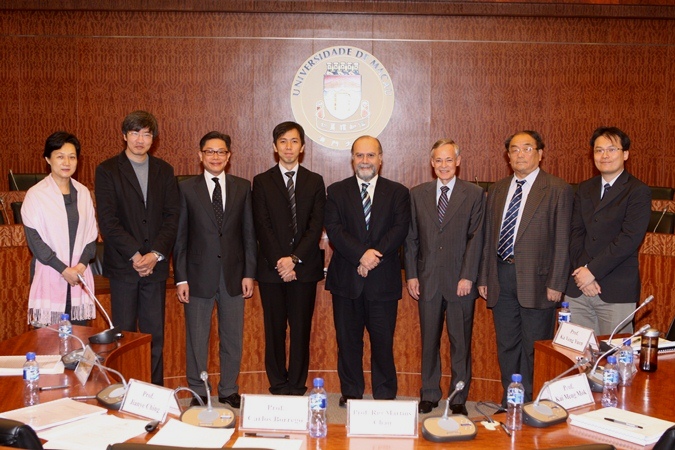|
|
| UM PhD student Mr. Hoi Ka In (4th from left) was highly praised by scholars for his research on air quality prediction model |
Accurately modelling the variation of ambient respirable particulates is very important as these particles affect human health and the environment. Mr. Hoi Ka In, a PhD student of the Faculty of Science and Technology (FST) of the University of Macau (UM), has developed the dynamic statistical air quality models which are adaptive to the changes of air quality system and in the meantime, proposed the methods enhancing the model efficiency and robustness. Scholars from the National Taiwan University, the City University of Hong Kong, the University of Aveiro and UM praised his research for advancing the development in the field.
Mr. Hoi’s thesis “Enhancement of Efficiency and Robustness of Kalman filter Based Statistical Air Quality Models by Using Bayesian Approach” puts forward a series of Kalman filter based dynamic statistical models for predicting the daily averaged PM10 concentrations recorded at the Taipa Grande ambient monitoring station. Normally, such kind of prediction is handled by the artificial neural network (ANN) model, which is a famous statistical model used in the field. However, Hoi and his supervisors Prof. Mok Kai Meng and Prof. Yuen Ka Veng thought that the training algorithm of the ANN model is non-adaptive and the actual air quality system should be changing from time to time. Therefore, they resorted to use the Kalman filter for developing the adaptive one. In addition, he improved the estimation of the unknown noise parameters of these Kalman filter based models by Bayesian approach. Also, he proposed an adaptive algorithm selecting the most plausible model from the model candidates based on the tradeoff between model efficiency and robustness. Finally, he found that the optimized model outperforms the ANN model and this was originated from the model adaptiveness. Therefore, he succeeded to correct this problem by imposing adaptiveness to the ANN with Kalman filter.
The judge panel consisting of scholars from the National Taiwan University, the City University of Hong Kong, the University of Aveiro and UM praised Mr. Hoi’s research for advancing the development in the field. They were impressed that apart from proposing a model that is adaptive to the dynamic change of the air quality system, Mr. Hoi also enhanced the correct application of the Kalman Filter and turned the artificial neural network model from a non-adaptive model to an adaptive one.
Mr. Hoi received his bachelor’s, master’s and PhD degrees from UM and upon graduation he remained at UM for research. He specializes in the statistical air quality modelling, and the model he developed has been put into application by the Macao Meteorological and Geophysical Bureau. Earlier this year, Mr. Hoi’s PhD thesis, which was co-supervised by Prof. Mok Kai Meng, dean of the Honours College, and Prof. Yuen Ka Veng, interim associate dean of FST, passed the oral defense with the highest classification. He acknowledged the UM research committee and the Science and Technology Development Fund for their financial support. In the meantime, he said that he encountered many bottlenecks in this Ph.D. study and luckily his two professors gave him many ideas which inspired him greatly. He would like to acknowledge them for their enthusiastic guidance, inspiration and support.
Prof. Mok noted that be a diligent thinker and one is bound to discover something new out of something ordinary. He added that to inspire students it is very important to encourage them to learn to think independently, ask questions, and reflect on what they are told by books and their teachers.

